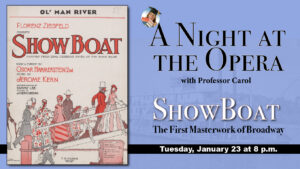The 1927 musical Showboat is very much on my mind. On January 23rd, Showboat will be our initial opera in this spring’s lineup for the series “A Night at the Opera.” Not the first Broadway musical we’ve offered in the nearly three-years of this series, Showboat is more than just another really good musical. With its piercing topics, gorgeous songs, and dramatic content that drove the show to nearly five hours in length in its initial concept, Showboat changed the destiny of the American musical.
 That is why I have called it “the most significant Broadway musical.” Yes, employing such a superlative can be dangerous in writing. “Most significant” according to whom, right? What qualities distinguished it above other works in its day? Was it the choice of story or quality of the lyrics? Did it generate the best melodies? Were the performances, staging, or choreography so exceptional that they set a new standard? Or was it something else entirely?
That is why I have called it “the most significant Broadway musical.” Yes, employing such a superlative can be dangerous in writing. “Most significant” according to whom, right? What qualities distinguished it above other works in its day? Was it the choice of story or quality of the lyrics? Did it generate the best melodies? Were the performances, staging, or choreography so exceptional that they set a new standard? Or was it something else entirely?
The answers to these questions will frame our session on January 23rd. (The session is free, by the way, and will be recorded for later viewing.) For now, let me state that Showboat changed the face of the Broadway musical. In fact, it drew not just a new face, but new arms, legs, and body insofar as the dramatic and musical possibilities offered by the Broadway stage. Showboat absorbed and reflected the flavor of its era (the Roaring Twenties) while setting forth timeless, deep, startling issues. It displayed new standards for characterizations. It bonded the talents of the experienced, prolific melodist Jerome Kern and young, endlessly creative lyricist Oscar Hammerstein II. Drawn to a hit 1926 novel called Showboat by the fascinating American author Edna Ferber, Kern and Hammerstein wanted to push aside the fluff, glitz, and glamor of the typical Broadway revues of their day. Yet their show required the same intensity of talent, costumes, staging, and financial resources employed by the exceptional entrepreneur Florenz Ziegfeld, who had made such American reviews known world-wide.
Even now I remember feeling cautious when I placed Showboat on the syllabus of the first opera-history course I taught at SMU. The year was probably 1986 and, despite the fact that the Broadway musicals had gained scholarly respect in the decades after World War II, there was still some boldness shown in placing Kern and Hammerstein’s partnership alongside that of Mozart and Da Ponte or Verdi and Boito.
Broadway musicals, though, are one of the best vehicles for illuminating the astonishing world of Mozart and Verdi, not to mention the rest of the operatic repertoire. Each opens doors to the other. In fact, I enjoy posing a particular question in public talks about the arts that I give to general audiences, particularly when the folks are in their 20s, 30s, or 40s (and thus not so likely to have been brought up with exposure to opera). I ask them to raise their hands if they like opera (or have a favorite opera). Not many hands rise. Then I ask them to do the same if they like musicals (or have a favorite Broadway musical). Nearly all hands rise. What could be more fun than to unveil how both genres belong to the same operatic family?
Musicals are a type of opera called, in English, a dialogue opera. Sister works would include Mozart’s endlessly appealing Magic Flute and Beethoven’s heroic opera Fidelio, and Bizet’s blockbuster Carmen. But, again, we will touch on all of this on the 23rd. I look forward to being back in the saddle with this series which, to my delight, has garnered so much praise from those who have come along with it since our first foray into the Zoom world in the COVID spring of 2020 (when we took up the story of Rossini’s Cinderella). We featured many good works in 2023, but as someone said to me at an event recently, “Surely there are a lot more operas we can do, right?”
Oh yes, my friend . . . a lot more. And we’ll take them on, as soon as we can. For this month, though, Showboat, with its gorgeous melodies, intense romantic dramas, and serious societal issues, will give us plenty on our plate. Come take your spot at the table!




In the case of Show Boat, I would make two observations. First, the standard thinking about the American musical says that Oklahoma was the groundbreaker. But years before that, in Show Boat, Hammerstein, who wrote the words for both, had already united all the elements of a show in the quest to make them support a realistic story of “real” people. Second, I think it’s so interesting that, decades after the more “operatic” sound of Show Boat gave way to jazzier Broadway musicals, the shows swung back to a style clearly shaped by opera in shows like Phantom of the Opera(!), the musical telling of Les Miserables, and some of Sondheim’s shows. (Interesting that, from an early age, Sondheim’s mentor was Hammerstein, a friend of Sondheim’s parents.) I think we are still seeing and hearing both types of shows now, and the contributions of Show Boat shine through in both.